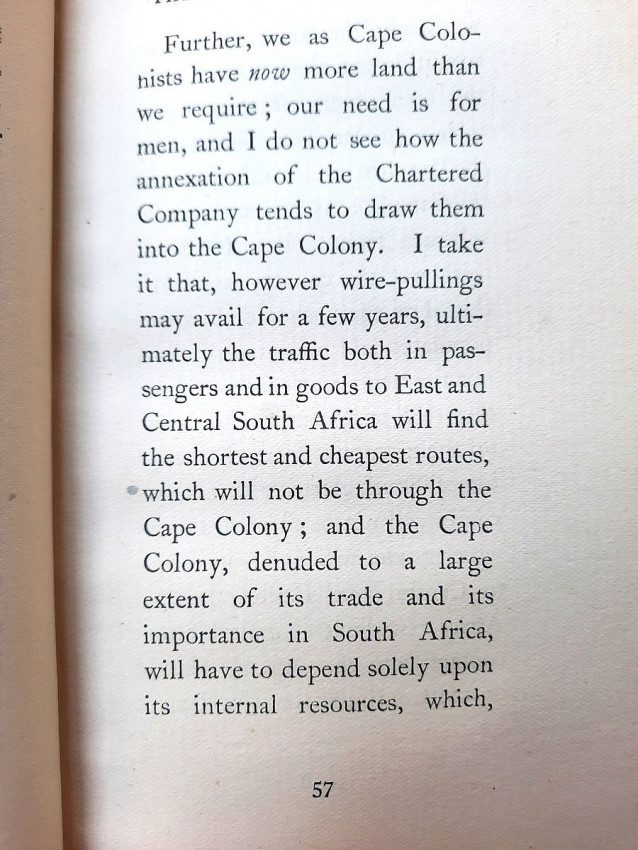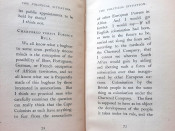This scarce document from South African political history is divided into two parts which contain different thematic sections including Retrogressive Legislation, Retrogressive Factors, Africa before the Monopolists, The Union of the Two Factors, Chartered versus Boer Rule, Chartered Versus Foreign Rule, etc. With special references to the Retrogressive Movement, Chartered Company, the Afrikander Bond, Monopolist Party, Bond Party, Retrogressive Party, etc.
"Two questions force themselves upon us when looking at our political situation in the Cape Colony to-day.
Firstly: What is the cause of that steady and persistent Retrogressive Movement which has marked our political existence during the last years?
Secondly: How is that Retrogressive Movement to be stayed?"
(From the introduction page/preface of the book).
"So again, with regard to land tenure; while in all progressive countries there is a tendency to obtain and retain as large a part as possible of lands, mines, and great public works as the property of, and to be worked for the benefit of, the nation as a whole—we, in this country, are for ever and completely alienating our public lands, our minerals, our precious stones, and even our public works. And further, not only are we alienating them within our own boundaries, and allowing almost without a struggle a small band of Monopolists to gain possession and control of that wealth which should be ours and our children's to employ for the benefit of the nation that shall be, but we are enabling them to grasp adjacent territories still uninhabited by the white man, so that when the mass of civilised men shall enter into occupation there, they will find nothing of value left for themselves in that state which, by their labour, they will have to build up; the alien will already have set his grasp upon all that is fair or rich. For not as in other countries has the Monopolist risen up among us, a growth of our own; he comes from a foreign clime, and sweeps bare the virgin land before him like the locust; and, like the locust, leaves nothing for his successors but the barren earth." (Quoted from pages 14-16)
"To-day a small, resolute, and keen body of men, amalgamated into Rings and Trusts, are quickly and surely setting their hands round the mineral wealth of South Africa. Our diamonds are already a complete monopoly in their hands; our gold, our coal, the richest portions of our soil, and even our public works, are tending to fall into the grasp of our great amalgamators. Not only are these men not South Africans by birth, which would in itself matter nothing, but in the majority of cases they are men who regard South Africa merely as a field for the making of wealth and the furthering of their own designs. When they have attained their end they do not feel themselves bound to the spot which has enriched them, but in most cases retire to Europe to expend the wealth of South Africa in the purchase of social distinction and in the luxuries of old-world life, or in further increasing their command over South African resources. And South Africa grows poorer!" (Quoted from pages 34-35)
“Granting what has been stated as being exactly true; allowing that the Monopolist has filched away the wealth of South Africa; and granting that his party, by coalescing with the extreme Retrogressive Party, has given it for the time being an unhealthy preponderance; granting, further, that to retain control over the Colonial Legislature squaring in all its multiple forms has been, and is, a necessity on the part of the Monopolist Party; granting that this is disastrous to our public and social life - yet is it not worth our while to connive at all these conditions, and to abstain from disturbing them, as long as the Monopolist Party is quietly and persistently moving in a direction which tends to annihilate the independence of two adjoining States, which shall ultimately render the Englishman dominant throughout South Africa? At the cost of whatever evils or injustice, is it not well to see extending northward the territory more or less under British rule?” (Quoted from pages 45-46)
“Further, we as Cape Colonists have now more land than we require; our need is for men, and I do not see how the annexation of the Chartered Company tends to draw them into the Cape Colony. I take it that, however wire-pullings may avail for a few years, ultimately the traffic both in passengers and in goods to East and Central South Africa will find the shortest and cheapest routes, which will not be through the Cape Colony; and the Cape Colony, denuded to a large extent of its trade and its importance in South Africa, will have to depend solely upon its internal resources, which, abundant though they be, are now allowed to lie undeveloped, while the people's eyes follow this northern will-o'-the wisp. But it may be said, and said very truly: “Granting that the Cape Colony does not gain either directly or indirectly through the possession of Rhodesia by the Chartered Company, and even that it loses heavily in the material sense, there is yet no reason, from the broadest humanitarian standpoint, why it should not support the movement.”” (Quoted from pages 57-58)
Original publisher's grey cloth; Text in English; Collation complete - Half-title, [1], Title page, 148 pages, plus [8] (a "Prospectus of Works about Africa and Africans"); Overall in very good condition. Boards have moderate edge wear with bumping to corners and dark rubbing to surfaces. Binding is tight and firm, with crushing to spine ends with small splits and fraying to cloth. Notable tanning to spine and edges. Some brown water staining to front board. Damp staining to the spine, with small bleached mark. Small area of loss to spine ends. Book has a slight forward lean. Small tear to edge of front free endpaper (3-4 mm) and tear to edge of leaf with pages 39-40 (4 cm). Uneven text block edges with creases and small tears. Otherwise the pages/text block is very bright and clean, no foxing throughout, only negligible yellowing. A sound copy.
IMPORTANT information regarding shipping: Shipping to South Africa possible via national post ($30) or Fedex/DHL Express service ($60-80). Shipping to EU & UK via registered Airmail trackable parcel ($30-40). Shipping to US via USPS ($30). For other countries please ask.
- Binding Condition: Good
- Overall Condition: Very good
- Size: 20 x 10,5 cm




















































